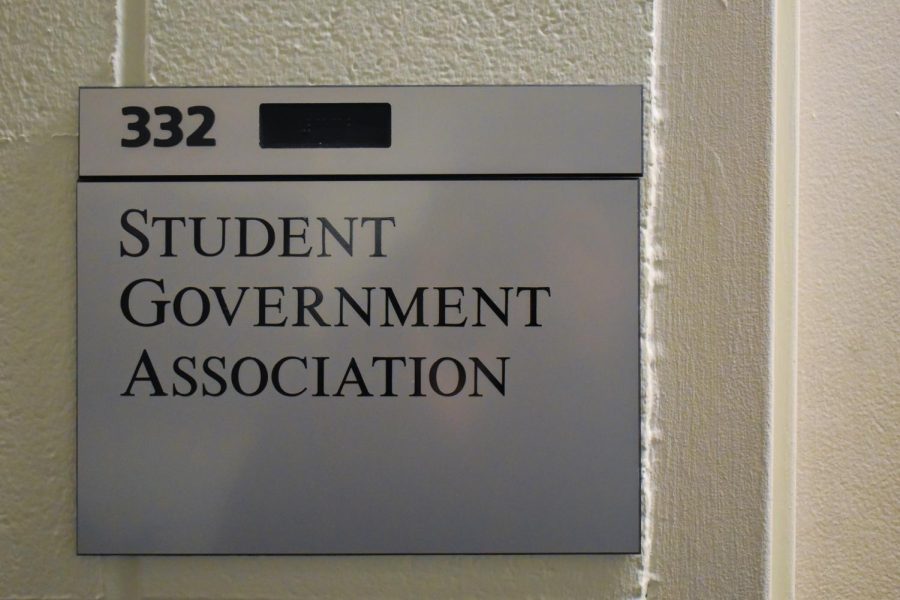SGA passes Sense of the Senate recommendations to improve emergency communication
The Student Government Association office at 332 Curry Student Center. SGA passed a resolution Nov. 28 to prioritize the improvement of campus communication during emergencies.
December 4, 2022
On Nov. 28, Northeastern’s Student Government Association, or SGA, voted on its first major resolution for the 22-23 school year, a Sense of the Senate on Northeastern Emergency Response and Public Safety Taskforce.
This was the work of the Student Services committee, chaired by committee Vice President Charlie Zhang, a third-year sociology and international business combined major. After the committee conducted a survey of 73 students, 98.6% of respondents agreed they felt NU Alert safety emails are poorly constructed and fail to convey appropriate resources.
A Sense of the Senate does not result in immediate action and is not official legislation. Rather, it serves as a public statement of the senate’s position on a specific topic and encourages the university to take up the issue.
The resolution was introduced at a full body senate meeting Nov. 14, where it was subject to questions from the senate about the accuracy of several clauses and the aim. The authors added amendments to address the concerns prior to the debate and vote at a full body senate meeting Monday evening.
The legislation passed in a vote of 51-6 with 23 abstentions.
“We wanted to make sure that the wording of this legislation is not, ‘we are voting for these things,’ but rather that the senate is in favor of these things,” said Senator Owen Kasmin, a second-year history and political science combined major, who co-authored the legislation. “We want these things to happen, so think of the ‘be it resolved’ clauses more like a wish list than a set of demands.”
The authors attributed their desire to take steps to create this change as a result of widespread student discontent with the NU Alert system during the hoax detonation incident in Holmes Hall Sept. 13.
Major concerns included the opt-in nature of the text alert system, a lack of timely notification and vague language that made some students anxious.
“This is one of the most important things that we should be doing right now as a group dedicated to the student body,” said Executive Director of Communications Olivia Oestreicher, a second-year political science and communications studies combined major. “This is something that I think we all know that the student body cares a lot about. It was deeply concerning when this stuff was happening on campus.”
The main request of the Sense of the Senate is to facilitate the creation of an internal student task force in collaboration with NUPD to collectively research and develop solutions to improve safety and security on Northeastern’s campuses.
“We realized after our conversations with ResLife and NUPD that to future-proof this task force, it needs to have a defined set of objectives,” Zhang said. “That last clause, improving transparency, collaboration and communication with public safety administrators captures that.”
The resolution also aims to improve training of Resident Assistants, or RAs, in collaboration with the task force, ResLife and NUPD. The goal is to provide more comprehensive training so RAs are better equipped to handle emergency situations and answer questions.
Kasmin motioned to adopt this legislation via unanimous consent, but it was objected to by Senator Giovanni Falco, a second-year criminal justice and political science combined major.
“I agree with the sentiment of the legislation. I just have some concerns about the bureaucracy that it creates between NUPD, SGA, the advisory board and all the other organizations that have been encompassed into this legislation,” Falco said. “We’re adding these extra steps, an extra layer that I just don’t think is productive in getting the things we want changed done.”
Zhang addressed Falco’s concerns about the possible creation of bureaucratic barriers. In his view, the resolution does a lot in the sense of helping SGA be a more vigorous advocate for community-based policing, and it opens up possibilities for enhanced communication between the community and NUPD to improve upon the current NUPD advisory board.
“The NUPD advisory board only meets, per their words, like three or four times a year,” Zhang said. “I think this very much acts as more of a funnel, so that students can work on the projects that they’re interested in, as well as having representation on that board with public safety administrators and faculty and staff.”
The Senate then moved to conduct a roll call vote, where it passed. Kasmin said he signed on as an author of the resolution because he felt it was fairly straightforward.
“The goal of it is not to say to the university and specifically the NUPD, ‘these are things that we require and these are things that you need to work on,’” Kasmin said. “Instead, it’s ‘these are things that we want to do to make this campus safer.’ I really think that’s an important sentiment that the senate should agree on.”
Parliamentarian Harrison Voigt, a third-year political science and economics combined major, added prior to the vote that senators should keep in mind this legislation is just a Sense of the Senate.
“It’s meant to help in our mandate and working with the administration on issues like this,” Voigt said. “And like a previous speaker said, this is an issue that’s really standing out on campus right now, and it needs our attention.”







